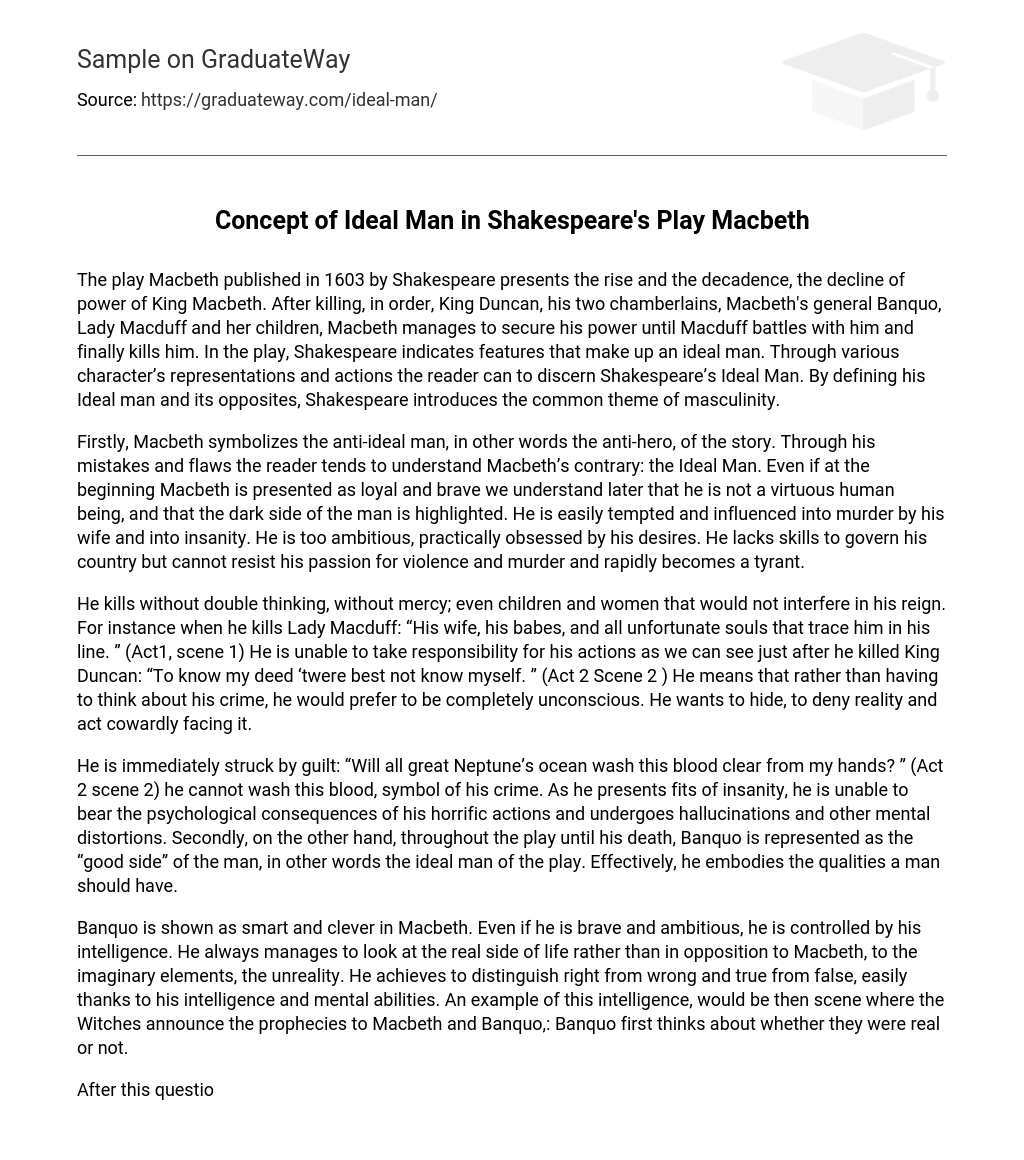The play Macbeth published in 1603 by Shakespeare presents the rise and the decadence, the decline of power of King Macbeth. After killing, in order, King Duncan, his two chamberlains, Macbeth’s general Banquo, Lady Macduff and her children, Macbeth manages to secure his power until Macduff battles with him and finally kills him. In the play, Shakespeare indicates features that make up an ideal man. Through various character’s representations and actions the reader can to discern Shakespeare’s Ideal Man. By defining his Ideal man and its opposites, Shakespeare introduces the common theme of masculinity.
Firstly, Macbeth symbolizes the anti-ideal man, in other words the anti-hero, of the story. Through his mistakes and flaws the reader tends to understand Macbeth’s contrary: the Ideal Man. Even if at the beginning Macbeth is presented as loyal and brave we understand later that he is not a virtuous human being, and that the dark side of the man is highlighted. He is easily tempted and influenced into murder by his wife and into insanity. He is too ambitious, practically obsessed by his desires. He lacks skills to govern his country but cannot resist his passion for violence and murder and rapidly becomes a tyrant.
He kills without double thinking, without mercy; even children and women that would not interfere in his reign. For instance when he kills Lady Macduff: “His wife, his babes, and all unfortunate souls that trace him in his line. ” (Act1, scene 1) He is unable to take responsibility for his actions as we can see just after he killed King Duncan: “To know my deed ‘twere best not know myself. ” (Act 2 Scene 2 ) He means that rather than having to think about his crime, he would prefer to be completely unconscious. He wants to hide, to deny reality and act cowardly facing it.
He is immediately struck by guilt: “Will all great Neptune’s ocean wash this blood clear from my hands? ” (Act 2 scene 2) he cannot wash this blood, symbol of his crime. As he presents fits of insanity, he is unable to bear the psychological consequences of his horrific actions and undergoes hallucinations and other mental distortions. Secondly, on the other hand, throughout the play until his death, Banquo is represented as the “good side” of the man, in other words the ideal man of the play. Effectively, he embodies the qualities a man should have.
Banquo is shown as smart and clever in Macbeth. Even if he is brave and ambitious, he is controlled by his intelligence. He always manages to look at the real side of life rather than in opposition to Macbeth, to the imaginary elements, the unreality. He achieves to distinguish right from wrong and true from false, easily thanks to his intelligence and mental abilities. An example of this intelligence, would be then scene where the Witches announce the prophecies to Macbeth and Banquo,: Banquo first thinks about whether they were real or not.
After this questioning, he warns Macbeth about the predictions as he says : “But ’tis strange; And oftentimes, to win us to our harm, The instruments of darkness tell us truths, Win us with honest trifles, to betrays In deepest consequence— Cousins, a word, I pray you. ” (Act 1 Scene 3) As he says that he explains to Macbeth that these weird creatures often trick people and betray in order to take advantage of the situation. He manages to take control of the situation, stay calm and reasonable not Macbeth who enthuses himself too much.
He is cautious: he accepts the faith but not accelerates it. For Shakespeare, the definition of an ideal man takes into consideration masculinity, as an important aspect of a character’s personality: in the play manhood is synonym to ideal man. As a consequence a model of manliness should exemplify the ideal man Shakespeare wants to define. For Instance, in the beginning of the play Macbeth is feminized by his wife Lady Macbeth therefore he is not represent as the masculine character of the play. He is not thinking about honour, keeping promises, ruthlessness and therefore bravery.
We can observe this attempt of making inferior and feminizing Macbeth by Lady Macbeth when she questions his masculinity in act 1 scene 7: “When you durst do it, then you were a men; and to be more than what you were, you would be so much more the man. ” She knows that this argument is effective on Macbeth; as a result he will commit the murder. On the other hand, Banquo is presented as the masculine character of the play. As masculinity means for Shakespeare knowing the difference between right and wrong, obeying conscience and knowing the moral, we can say therefore that Banquo is masculine, and hence, the ideal man of the plot.
Indeed, he is not tempted as Macbeth by the witches and by their predictions. In conclusion, throughout the play Macbeth, Shakespeare tries and manages to give us a definition of an Ideal Man for him. Macbeth embodies the opposition and Banquo the true masculine, ideal man: The model should be loyal, intelligent, brave, cautious, clever, and obeying the morality. Shakespeare’s definition anticipates his era, these elements will come up later: we can say that it is a more modern one.





